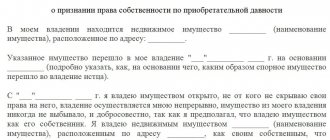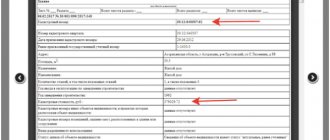What is a “previously existing right to real estate”?
First, a little theory.
State registration of rights to real estate in its modern form began to be carried out from the moment when Federal Law No. 122-FZ of July 21, 1997 “On state registration of rights to real estate and transactions with it” came into force. In accordance with it, the Registration Service was created, which began to enter information about all emerging rights to real estate in the state register of rights.
However, rights to real estate objects arose even before the creation of the registration service and register of rights. They are recognized as having previously arisen if the title documents for them are drawn up in accordance with the procedure in force at the time of their occurrence.
What are these documents?
If we are talking about rights to a land plot, then these could be, for example:
- certificate of ownership, right of lifelong inheritable possession, permanent (perpetual) use of land, issued in accordance with Decree of the Government of the Russian Federation dated March 19, 1992 No. 177 “On approval of forms of certificate of ownership of land, lease agreement for agricultural land and agreement temporary use of agricultural land";
- a state act certifying the ownership of land, lifelong inheritable possession, perpetual (permanent) use of land of citizens, enterprises, institutions, organizations or peasant (farm) households, drawn up in accordance with Resolution of the Council of Ministers of the RSFSR dated September 17, 1991 No. 493 “On approval forms of state act on the right of ownership of land, lifelong inheritable possession, perpetual (permanent) use of land”;
- certificate of ownership of land, issued in accordance with Decree of the President of the Russian Federation dated October 27, 1993 No. 1767 “On the regulation of land relations and the development of agrarian reform in Russia”;
- a document containing a decision to provide a land plot with a certain right to a specific person, issued by an authorized body (organization) in the manner established by the legislation in force at the place of publication of such a document at the time of its publication;
- an extract from the household register, drawn up in accordance with the order of Rosreestr dated 03/07/2012 No. P/103 “On approval of the form of an extract from the household register on the citizen’s right to a land plot”;
- lease agreement for a land plot, the term of which has not expired at the time of application to Rosreestr, etc.
These documents must be issued by the appropriate authority (usually local administrations or land committees).
If we are talking about rights to a house, apartment or other capital construction project, then the rights to such objects should have been registered by the body carrying out registration for that period of time (as a rule, this is the technical inventory body - BTI).
If the rights to an apartment, residential building, land plot or other real estate were acquired before January 31, 1998 and arose on the basis of one of the listed documents, then they are considered legally valid.
State registration of such rights in the Unified State Register of Real Estate (USRN) is carried out either at the request of their owners, or when registering real estate transactions.
But what if you don’t have any title or title documents on hand?
We hasten to reassure you: not everything is so hopeless. Theoretically, the USRN may contain information about previously arisen rights.
Registration of land ownership: necessary documents
State registration of land rights consists of entering information (including legal information) into the Unified State Register.
Land ownership does not require mandatory registration, since the law on real estate was established before the decree on land territories came into force. If it is still necessary to carry out this procedure, then you need to collect a number of documents and submit them to the relevant authorities.
State registration of ownership of land territory is issued only after all necessary documents have been submitted. These are:
- Cadastral passport. Each land plot is given its own cadastral number. It is certainly indicated in the Unified State Register of Property Rights. Therefore, the provision of this paper is mandatory. This document calculates taxes that the owner must pay annually. If a plot of land has been surveyed, then the cadastral passport must contain forms B1, B2, B3, B4, B5, B6, B7. In the case where such a procedure was not carried out, registration of land ownership will only be in Form B1. Such paper is valid only in the case of registration of territories for certain purposes. These include land for: farming; construction; gardening; gardening; private construction.
- Statement. May be submitted by either the copyright holder or an authorized representative. In the case of the second option, you need to draw up a power of attorney and notarize it. An application for registration of ownership of land territory is written only in a certain form and in only one version.
- A document base. This paper is required when registering land. This confirmation can be:
- act on the provision of land;
- certificate of ownership;
- extract from the business book;
- a document that confirms the right to land territory.
- Certificate of payment of the state duty in full.
How can I find out about previously acquired rights?
A peculiarity of previously arisen rights to real estate is that today there is no information about them in the Unified State Register of Real Estate, while information about the object itself was previously transferred from the technical accounting authorities and entered into the State Real Estate Cadastre (GKN).
Due to the fact that since 2021, information from the State Property Committee, along with information from the Unified State Register of Rights (USR), is included in the Unified State Register of Rights, today there is a real opportunity to find out about the existence of such rights.
To do this, it is enough to request from Rosreestr an extract from the Unified State Register of Real Estate about the property.
So, if the Unified State Register contains information about previously arisen rights, then in the column “Special notes” of Section 1 of the extract from the Unified State Register about the property it is indicated:
- type of right and size of share in the right;
- last name, first name, patronymic (if any) of the individual copyright holder or full name of the legal entity copyright holder;
- details of the documents (if any) on the basis of which the relevant information was entered.
Accordingly, if this information is not indicated in the “Special Notes” column, this means that there is no information about previously arisen rights in the Unified State Register of Real Estate.
And this is a completely different story...
You can obtain an extract from the Unified State Register of Real Estate about a property, regardless of its location, in several ways:
- by personally contacting any MFC office;
- by using the on-site reception service provided by the Cadastral Chamber;
- by mail;
- through electronic services on .
Dear applicants!
We inform you that if the right that arose before January 31, 1998 (that is, the day of entry into force of the previously in force Federal Law of July 21, 1997 No. 122-FZ “On State Registration of Rights to Real Estate and Transactions with It”) does not registered in the manner prescribed by law, then when applying for registration of the transfer of rights to a real estate property, an application for registration of a previously arisen right is required.
From January 1, 2021, the procedure and requirements for state registration of rights to real estate are determined by the provisions of the Federal Law of July 13, 2015 No. 218-FZ “On State Registration of Real Estate”. This law recognizes as legally valid rights to real estate objects that arose before January 31, 1998 in the absence of information about them in the Unified State Register of Real Estate.
State registration of such rights in the Unified State Register of Real Estate is carried out at the request of their owners.
Moreover, in the case when state registration of the transfer of such rights, their restrictions and encumbrances is carried out, or a transaction is concluded in relation to a real estate object after January 31, 1998, registration of previously arisen rights to real estate objects is mandatory, unless otherwise established by the Civil Code of the Russian Federation and Federal Law “On State Registration of Real Estate” (Registration Law). Therefore, when registering the transfer of a previously arisen right, the restriction of such a right and the completion of a transaction in relation to such a right, an application from the copyright holder for registration of the previously arisen right must be submitted for registration. That is, when selling, for example, an apartment for which the rights have not been registered, the seller must write an application to register his rights to it and at the same time write an application for the transfer of rights to the buyer. Moreover, if the registration of a previously arisen right is carried out simultaneously with the registration of the transfer of rights to a real estate object, the state fee for registration of a previously arisen right is not charged. The absence of such an application is grounds for suspension of state registration due to failure to provide documents necessary for state registration of rights. It should be noted that an application for state registration of previously arisen rights to a property can be submitted by a notary who has certified the transaction on the basis of which the state registration of the transfer of such rights, their limitation and encumbrance of the specified real estate is carried out.
Why do you need to register a previously arisen right?
So, thanks to the presence of title documents or with the help of an extract from the Unified State Register of Real Estate, you are convinced that the property you are interested in has previously arisen rights. What to do next?
As we said earlier, these rights are legally significant. Therefore, no one obliges their owner to apply for their registration with Rosreestr. However, we strongly recommend that owners do so.
Let's explain why.
- Firstly, when concluding almost any real estate transaction (purchase and sale, gift, exchange, pledge, lifelong maintenance with dependents, rent), the presence of a registered right is proof of your competence for the second party to the contract.
- Secondly, when registering a transaction, state registration of a previously arisen right will still be required - it is carried out simultaneously with the registration of the transfer of ownership. And at the same time, a situation often arises when errors are discovered in old title or title documents, which does not allow the state registrar to carry out registration actions. In simple terms, until the discrepancies in the documents are eliminated, the transaction cannot be completed!
- Thirdly (and this is very important!), without registering a previously arisen right with the Unified State Register of Real Estate, you cannot protect your property from fraudsters by recording the impossibility of making transactions without the personal participation of the property owner.
If you, as a property owner, are convinced of the need to confirm a previously arisen right in Rosreestr, follow our further instructions.
Required documents
Registration of real estate by a legal entity, both an apartment in a residential building and an office building, requires the collection of a fairly large package of documentation. And this stage needs to be given special attention, since incorrectly completed documents can significantly delay the completion of the task. And at this time, the organization’s rights to use not yet registered property will be significantly limited.
Here is a standard list of documents that must be submitted to Rosreestr:
- an application filled out in the prescribed form;
- receipt of payment of state duty - for legal entities it currently amounts to 22,000 rubles;
Important! The fees paid for registration actions vary in amount depending on the nature of such actions.
- passport of a representative of the owner organization and power of attorney to carry out registration actions;
- documents confirming the legal capacity of the legal entity that claims its rights to the sought-after property;
- certificate of the presence of structures on the land plot (if land ownership is registered);
- documents confirming the legality of the operation of the registered facility;
- confirmation of rights to the land plot on which construction is planned (if the ownership of the building plot is registered);
- permission to conduct construction (when registering a recently completed structure);
- information about sources of financing for the acquisition of real estate;
- documentation confirming the absence of any claims from third parties;
- documents from the cadastral service and BTI;
- certificate confirming the assignment of a permanent address to the registered property.
Providing the state registrar with a complete package of necessary documents is a prerequisite for a quick and easy registration process.
At the same time, it must be taken into account that, depending on the individual specifics of the situation, additional documents may be required.
Therefore, to determine their complete list, as well as to comply with all the requirements of Rosreestr, it is recommended to seek help from experienced lawyers who know all the intricacies of registering the rights of a legal entity to a property.





